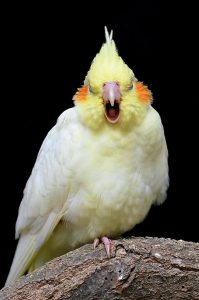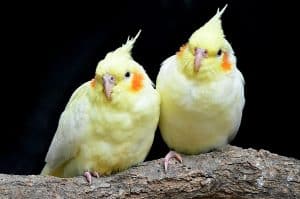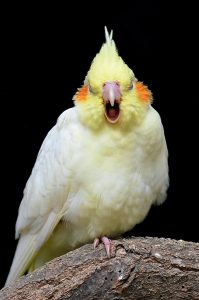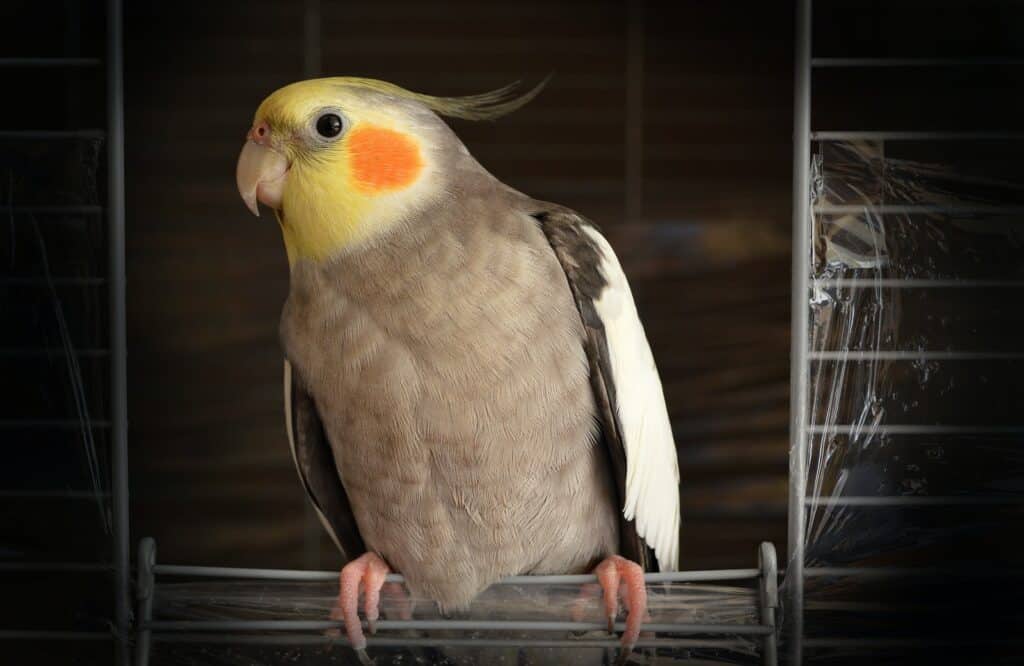In this article, we will explore the reasons why cockatiels sing, the different types of singing they engage in, and what their singing behavior can tell us about their well-being. Understanding why cockatiels sing can help us provide better care for our pet birds and appreciate the beauty of their singing even more.
Why Do Cockatiels Sing?
Cockatiels, are considered vocal learners, however, in most vocal learning animals the innate constraints for incorporating novel sounds. Cockatiels inhabit flocks in their native Australia, and contact calls are important for notifying others in the flock if a predator is too close for comfort. A wild cockatiel flock is a cacophony of vocalizations, including joyful foraging noises, “Yes, you may perch here,” and “Did you hear that?” squeaks and squawks.
Cockatiels generally sing songs, sing a marching sound most often at sunrise and sunset, although this does not rule out the possibility of a pet cockatiel speaking throughout the day. A happy, lively cockatiel will not check the clock to see if it is chirp or whistle time because it does not care whether it is morning or afternoon.
Male cockatiels, in particular, are prone to start imitating human whistles when the mood strikes them, especially if they see their reflection in a mirror or other reflecting item like a lacquered vase; but this does not negate the possibility of them whistling to themselves or you.
Your cockatiels imitate human music with their whistle-like vocal sounds, so don’t be alarmed if you hear them whistle like vocal sounds
Here are some of the most frequent cockatiel whistle like vocal sounds, as well as a brief explanation of what your animal vocal communication signify.

The Cockatiel Contact Call: “Where’d you go?!”
With contact calls, a pet cockatiel will attempt to keep the movements of household members in check. When you depart the room, bird begins to produce sounds, makes a chirp or series of chirps that implies, “Where are you going and when will you return?”
Even a “hands-off” cockatiel will call to its owner from its perch location in the cage if you leave the room. When you turn a corner out of sight, answer your cockatiel’s contact call with a quick whistle.
The Cockatiel Alarm Call: “Attention! Attention!”
Birds are vocal creatures, if anything startles a pet cockatiel, it might sound an alarm call. This is a louder, more strident chirp that lasts until the bird becomes calm.
An alarm call can be triggered by almost any loud or irregular noise, such as a truck rumbling down the street, a crow flying overhead, or a dog being walked on the sidewalk outside. When you move a chair across the room, sweep the floor, drop a dish, or take up phone conversation inside your home, your cockatiel may find it necessary to vocalize.

A Happy And Content Cockatiel
A happy and calm cockatiel makes this sound by grinding its beak. This is generally accompanied by face feathers that are spread out over the beak and a relaxed, fluffed body feathering. Shortly before falling asleep, a drowsy cockatiel may grind its beak.
The Cockatiel “Leave Me Alone!” Noise
An uptight cockatiel will have an uptight appearance — the feathers will be firmly held in place — and it may give out a quick hiss to express its displeasure. You don’t want to hear your cockatiel make any of these noises.
When threatened, a cockatiel may go into hiding in its cage or travel carrier and hiss like a snake. This is sometimes the case with cockatiels that have not been introduced to people, such as an unsocialized cockatiel being relocated from the pet shop to a new home. If the cockatiel is scared, it’s critical not to force interaction. Instead, allow the cockatiel some time to acclimate itself to its new surroundings.
Cockatiel “Ready For Bed” Signal
When a cockatiel is ready for some shuteye, it may issue a bedtime call, such as attention-grabbing chirps. It’s also your cockatiel’s way of telling you to go to sleep.
- STURDY METAL CONSTRUCTION: Constructed of quality wrought steel coated with rust-and water-resistant hammered paint, this divided breeder cage boasts excellent strength and durability, which is ready for your birds to use for years to come.
- FLEXIBLE BREEDING CAGE: The dividing grate helps divide this wide bird cage into two individual breeding/living spaces for housing two or more birds. Each bird cage system contains 2 perches, 2 feeders, a lockable door, a side nesting door, a pull-out tray and a grate. Or you can remove the middle grate to make it a bigger cage.
- STACKABLE FOR MORE VERSATILITY: Got many birds but had limited space to keep them? This stackable breeding cage is your best solution. You can pile up two or three cages together to efficiently leverage the vertical space in the room and save space.
- PET-PARENT FRIENDLY: Four perches and four plastic cups are included for your convenience. The cage has 4 feeding doors on the face for easy seed and water refilling.
- EASY CLEANING: With the waterproof finished cage and the bottom slide-out tray, cleaning for this cage would be a breeze for pet parents. The pull-out grate at the bottom prevents birds from walking in its excrement.
Cockatiel Inquisitive Chirp
A cockatiel that is unsure of something might make a single “What was that?” chirp, as if it isn’t quite sure what to think about the situation. This could be your cockatiel’s way of wondering, “What do you think of that sound?”
Talking ’Tiels

Cockatiels, like most parrots, who have vocal learning nervous system are also known to talk. Cockatiels have limited vocal compared to other parrots such as African greys and Amazon parrots and have complex vocal communication abilities, but they can be taught to say a few words especially if they frequently heard human voices or phrases, such as “Hello,” “Beautiful bird,” “I’m a wonderful bird,”
Male cockatiels tend to be more talkative than female cockatiels. To get a cockatiel to talk, mimic sounds or phrases and then go on to another word or phrase once it has mastered it.
Your cockatiel makes not only the melody but noises like human whistling to communicate with you. You should inspect why your cockatiel is squawking, just as you would examine why the dog is barking, especially if it appears worried. Is there a cat outside the window? Is anything out of place in its cage?
Or is it hearing music or human whistle as cockatiels likely prefer to imitate human sound. And if your cockatiel is alone in another room, its chirps might be used to alert you that it’s over there… talk to me! Cockatiels have a remarkable ability for flexible vocal control similar to what is seen in human singing.
The Scream
This one is self-explanatory. Male cockatiel and female cockatiel may produce a shrill, high-pitched squeal that is difficult to ignore.
It’s all about getting their attention, even the name of it. It’s there for them to use if they’re sad, lonely, scared, or otherwise unhappy. Cockatiels are naturally sociable beings, thus they may screech to alert other birds to a predator in the area or to notify them about any additional problems they may be having.
So, what does it indicate when your cockatiel screams or tries to imitate human speech sounds? We have no idea — that’s up to you to figure out. However, as you get to know your bird better, you should be able to identify what upsets them.
Keep your pet’s environment safe with Are Paint Fumes Bad for Cockatiels?. For a unique perspective on health, explore Chocolate and Dental Health. Finally, understand common cockatiel behaviors in Why Does a Cockatiel Stand on One Leg?. Each article offers valuable knowledge to help you ensure your cockatiel’s well-being and happiness.
- Why Is My Cockatiels Poop Watery
- Why Is My Cockatiel Vomiting
- Why Is My Cockatiel So Quiet
- Why Is My Cockatiel Shaking
- Why Is My Cockatiel Losing Feathers
- Why Is My Cockatiel Laying Eggs On Bottom Of Cage
- Why Is My Cockatiel Eating So Much
- Why Is My Cockatiel Chirping So Much
- Why Does My Cockatiel Scream When I Leave The Room
- Why Does My Cockatiel Nibble Me
- Why Does My Cockatiel Keep Yawning
- Why Does My Cockatiel Hang Upside Down
- Why Does My Cockatiel Fly On My Head
- Why Does My Cockatiel Face The Wall 6 Reasons
- Why Does My Cockatiel Bob His Head
- Why Does A Cockatiel Stand On One Leg
- Why Do Cockatiels Sing
- Why Do Cockatiels Hiss
- Why Do Cockatiels Have Crests
- Why Do Cockatiels Eat Their Poop
- Why Do Birds Rub Their Beaks
- Why Do Birds Poop In Their Water
- Why Cockatiels Like Head Scratches
- Why Cockatiels Grind Their Beaks
- Why Choose A Cockatiel Bird As A Pet
- Why Are My Cockatiels Tail Feathers Falling Out
- Why Are My Cockatiels Fighting
- Why Are My Cockatiels Feet Warm
- Why Are Cockatiels So Dusty




